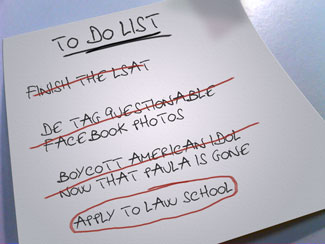The Law School Application To Do List
- by
- Dec 09, 2009
- Admissions
- Reviewed by: Matt Riley


In addition to heading to Vegas in every spare moment and searching for the perfect beard trimmer, Dave provides application consulting for Blueprint LSAT Preparation.
“Now you gushin’, ambulance rushin’
You to the hospital with a bad concussion
Plus you hit four times but it hit yo spine
Paralyzed waist down and ya wheelchair bound”
-T.I., Dead and Gone
For purposes of this post, we’ll assume that T.I. was metaphorically discussing the post-LSAT bloodbath. By now, you’ve probably all run through the gamut of reactions, ranging from “My score will be so good I’m gonna blow off law school and get into test preparation” to “well, I guess the world needs ditch diggers too.” Still, you’ve probably got another two weeks or so of stewing in your semi-fetid pool of agony and second-guessing until El Sat scores arrive.
Sounds like a good time to get applications done! Because there’s no better time to write a personal statement than when you are filled with self-loathing.
Ideally, all you December test-takers are going to want to have your applications ready when LSAT scores come out sometime around Christmas. That way, when that day of destiny comes, you can just log onto LSAC, plug your score into the applications, and click submit well ahead of the majority of applicants.
It’s not the end of the world if it takes you until the end of December/early January to get your applications done, but you really don’t want to wait until too long after that—application deadlines start kicking in toward the tail end of January.
If you haven’t already started on your applications: literally not requested a single letter of recommendation, not given an ounce of thought into what you will write about for your personal statement, not figured out the best way to phrase your criminal indecent exposure addendum, then I have created an application checklist for you.
1. Letters of Recommendation
This is the first thing you get done. Typically, you would want to finish your personal statement first, but time is becoming a bit of a crunch here so you’re going to want to request your letters as soon as possible. Professors in general, unless they have significant personal experience with you, can be unreliable when it comes to deadlines for these things so it is best to get your requests in early.
2. Personal Statement
This is the most important part of the application aside from LSAT score and GPA. It is here where you decide if you want to share the heartwarming story of the time you coached nine disadvantaged inner-city kids to a youth baseball championship, learning and teaching life lessons along the way OR the time you saved a small Peruvian town from a herd of marauding water buffaloes. Tough choices are made here, but the important thing to remember is this: make sure it demonstrates why you’re unique and why you want to go to law school.
3. Resume
Your resume should cover mostly your college-era (or post graduate) achievements/jobs/awards. Although it was of course cool when it happened, no one needs to know that you won the science fair in 3rd grade by explaining light refraction in water semi-coherently. Unless you spent every waking moment of college heavily involved in some group or another, the general rule of thumb is that the resume should typically be just one page.
4. Explanatory essays
These are the essays for a bad GPA and bad/multiple or cancelled/multiple LSAT scores. For the GPA, the number one thing is to have been a real problem. “I was lazy” is not a real problem according to law schools, although as a guy who once woke up in time for and failed to attend two finals, you have my complete empathy. Medical problems, changing majors, and serious personal issues are generally better explanations.
Depending on the application, there will also be options for additional essays which, if they even remotely apply to you, you should complete. This includes the criminal record explanation. If you have a felony or misdemeanor on your record; disclose it. While it may have an effect on your application, not disclosing it will leave you with a tough ethical explanation when you are reviewed for your Bar number.
Now, if you end up receiving a score come Christmas that leaves you with existential questions, and elect to take the February test, you have to decide whether you want to apply this round or wait until next Fall. As Colin explained, if time isn’t of the essence, applying to law school the following Fall is probably the safest bet. But if you are dead set on attending next year, then you’ll want to make sure that the law schools to which you are applying accept February scores (also covered in Colin’s post).
All 800 words of that being said, you’re about 2 weeks away from knowing whether you’re applying to Yale or Burger King. Take the time to work on your applications, and ignore that gnawing sensation in the pit of your stomach. The worst part is over. You can now look forward to 35 or so years of being a lawyer.
Search the Blog

Free LSAT Practice Account
Sign up for a free Blueprint LSAT account and get access to a free trial of the Self-Paced Course and a free practice LSAT with a detailed score report, mind-blowing analytics, and explanatory videos.
Learn More
Popular Posts
-
logic games Game Over: LSAC Says Farewell to Logic Games
-
General LSAT Advice How to Get a 180 on the LSAT
-
Entertainment Revisiting Elle's LSAT Journey from Legally Blonde








